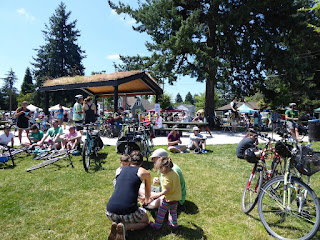 Sometimes, on good days, Portland reminds me of Dresden, without all the bombed-outness. We visited a friend in Dresden some years ago, and even though significant portions of the city were war-damaged or soiled or missing altogether, there was still a sense that people had their priorities straight. You could tell right off that they were doing something right because they were energetic and healthy while carrying a beer in one hand and an ice cream cone in the other. No one seemed either particularly prosperous or destitute. Our friend didn’t have much money but neither did anyone else. There’s a level of contentment to be had in modest means, shared. The roads were filled with pedestrians, or people walking their bicycles, which doubled as baby strollers. The middle of any street was packed with people, and behind them would be a humbled automobile with its gearshift set on “plod.” One didn’t get the sense that the driver was at all impatient, either. He understood where he belonged in the processional. The celebrants were all ahead of him and he just carried the train.
Sometimes, on good days, Portland reminds me of Dresden, without all the bombed-outness. We visited a friend in Dresden some years ago, and even though significant portions of the city were war-damaged or soiled or missing altogether, there was still a sense that people had their priorities straight. You could tell right off that they were doing something right because they were energetic and healthy while carrying a beer in one hand and an ice cream cone in the other. No one seemed either particularly prosperous or destitute. Our friend didn’t have much money but neither did anyone else. There’s a level of contentment to be had in modest means, shared. The roads were filled with pedestrians, or people walking their bicycles, which doubled as baby strollers. The middle of any street was packed with people, and behind them would be a humbled automobile with its gearshift set on “plod.” One didn’t get the sense that the driver was at all impatient, either. He understood where he belonged in the processional. The celebrants were all ahead of him and he just carried the train.
This is as it should be, people.
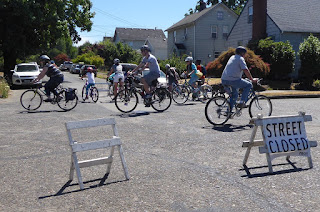 As the masses milled about the ancient city, its stone buildings stained by a few hundred years of coal, with bright flounces of graffiti at their hems, I felt I was looking at the past and the future at the same time. This poorer nation was demonstrating our future–if we do it right.
As the masses milled about the ancient city, its stone buildings stained by a few hundred years of coal, with bright flounces of graffiti at their hems, I felt I was looking at the past and the future at the same time. This poorer nation was demonstrating our future–if we do it right.
Portland is groaning under new wealth but still taking deliberate aim at a sensible future. Meet Sunday Parkways. Periodically, on summer Sundays, the city closes off a goodly loop of streets to auto traffic and the neighborhood blooms with bicyclists, enjoying life in a civilized setting. It’s not at all enjoyable for people in cars trying to get somewhere in the vicinity, of course. But shoot: car-driving makes people crabby anyway. That’s a known fact.
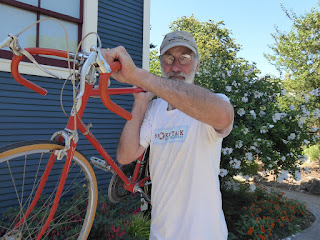 Our local loop was eight miles, give or take, and included three major parks, with musicians and entertainers in them, along with food booths and free stuff. I’ve been in many mass-bicycle events but this one was different; we poked along, coasting behind little boys on scooters, and tandems with freeloading toddlers, and life in general slowed down so much it was strokeable. Portland Opera was set up at the first park and we discovered that, whatever else we’d planned to do that day, we had plenty of time to sit in the grass and listen to a dozen arias.
Our local loop was eight miles, give or take, and included three major parks, with musicians and entertainers in them, along with food booths and free stuff. I’ve been in many mass-bicycle events but this one was different; we poked along, coasting behind little boys on scooters, and tandems with freeloading toddlers, and life in general slowed down so much it was strokeable. Portland Opera was set up at the first park and we discovered that, whatever else we’d planned to do that day, we had plenty of time to sit in the grass and listen to a dozen arias.
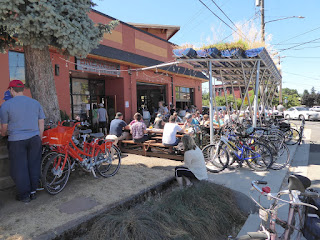 The entire first half of the loop was downhill with a sturdy tailwind, so I was bracing for the return trip, but in FutureLand it’s downhill both ways. So many neighbors had claimed the peaceful streets that it seemed impossible we wouldn’t run into someone we knew. Dave ran into someone he didn’t know, but neither of them got too badly banged up. His bike is fine too. You can’t really mess up a 1965 orange Schwinn Varsity. That vintage hunk of lead is now a certified classic and earned many compliments from those not called upon to operate it.
The entire first half of the loop was downhill with a sturdy tailwind, so I was bracing for the return trip, but in FutureLand it’s downhill both ways. So many neighbors had claimed the peaceful streets that it seemed impossible we wouldn’t run into someone we knew. Dave ran into someone he didn’t know, but neither of them got too badly banged up. His bike is fine too. You can’t really mess up a 1965 orange Schwinn Varsity. That vintage hunk of lead is now a certified classic and earned many compliments from those not called upon to operate it.
I looked around at the liberated streets and the smiles of the children and I said, fuck it: I’m leaving my helmet at home. I never wore one till I was 35 or so and I’ve hated it ever since. I suppose I should have been a good influence on the children, but then I realized that now is as good a time as any for our young people to recognize I’m not their best role model.
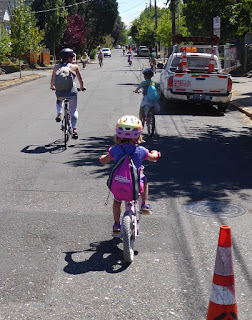 Hiphop at Alberta Park, blues at Woodlawn; gentle breezes turned with us and remained at our backs; miracles abounded; and then we rode right past a particularly fine brewpub. Ha ha! Of course we didn’t. If you don’t sit on a bioswale with your bike against a tree on a Sunday Parkway enjoying a pint of Breakside IPA, you’re not doing it right.
Hiphop at Alberta Park, blues at Woodlawn; gentle breezes turned with us and remained at our backs; miracles abounded; and then we rode right past a particularly fine brewpub. Ha ha! Of course we didn’t. If you don’t sit on a bioswale with your bike against a tree on a Sunday Parkway enjoying a pint of Breakside IPA, you’re not doing it right.
You get a city like this on purpose. You combobulate neighborhoods where almost anything you need or want is a walk or a bike-ride away, and then–well, that little girl with the butterfly wings and the pink helmet and training wheels? That’s all the faster you need to go.
Now to shut down some of those streets for good.
What a great event! But wear your helmet. I learned a lot about the brain because of my daughter's brain surgery, and you only get one brain—take care of it. For your readers' sake.
Yes, mommy.
Honestly, first time I've gone without in thirty years. But oh god did it feel good.
With your proclivity for falling down, I must agree with Knittergran: wear a helmet. I'd take it a step further and say, wear it when walking about as well. (It can be a beer helmet, if that makes it any easier to tolerate.)
Okay, okay! Jeez. You know, I think it's been a year since I fell down. No wait, once last week…
Ya know… if you're not going all that FAST on your bicycle, seems to me a little less important that you wear a helmet. Plus, at the very least, it's (probably) not illegal (for you): "Laws in 22 states and at least 201 localities require helmets, although few cover adults."
Similarly, “There is no state that regulates proper footwear for operating a motor vehicle, with the exception of Alabama, where it is prohibited to drive a motorcycle while barefoot.”
On another front – you got me to look up "bioswale" – the definition of which prompted me to look up "riprap" as well. Nice!
See, that was my reasoning, but then again I've been hit on the head a lot, so it might not be worth much. Bioswale. We have tons of them here. Not so much with riprap, but they're built into the street infrastructure as bike lanes are added (more efficient to do it all at once). That's a bioswale there in the foreground of the Breakside Brewery picture.
Where were the dogs? It can't be absolutely perfect without lots of big ole' dogs, smiling at every stranger and patiently pausing to receive a pat or two. Or is Portland cats-only?? Youth wants to know.
You know, didn't see many dogs. Which is odd, because dog ownership is the law around here, with big ole dogs preferred, but barking purse hamsters acceptable.
Abut free-range dogs aren't allowed in Portland. Dogs must always be leashed in public, except at dog parks.
I suppose that's the law too, and you don't see many free-range dogs, but I think that's because people have a lot invested in vet care and outfits and doggie day care and special chow and they really want to keep a leash on it all.
Hereabouts, wheels, any wheels, over-ride(literally!) feet. Bloody skateboards!
I rode a bike as a youngster, way before someone invented the skid lid. These days, my wheels go round, but the frame is bolted to the floor.:-)
Ooo Dave hates skateboards! Don't get him started.
Slowed down to strokeable sounds blissful…
Any slower and you're asleep, which is also very nice.
I want to move to Portland!!
Who doesn't? Save your pennies.
i'm glad to see portland living up to the promise I felt in '76 and '77, when Neil Goldschmidt did the downtown project that changed the city. I wondered if it would continue, I'm glad it did.
Portland has always been the weirdest city (of it's size) on the coast. I hope it continues, I hope it gets past the focus that the altright has on the city, I hope it prospers for the people like us.
Maybe you'll meet my son, Henry someday. It's a small town. I think you'd like him, and his mate Kate.
Cheers,
Mike
But Murr, you really shoulda seen Bend in the late 50's…it was something. And Portland in '71, when things were really chaotic. A time worth experiencing.
Even more important–Neil DIDN'T do the Mt. Hood Freeway project that would have destroyed the city! He's still a hero of mine although none will now speak his name. But people are complicated.
I did come to Portland in '76, and Dave was born here–still lives 7/10ths of a mile from his original home.
What a great idea!
Now talk your town into it.
This made me happy.
This made a lot of folks happy. I should go to the next one too, even though it will be in another neighborhood and I'd have to (sigh) wear my helmet to get there.
I love that idea of closing the streets to traffic so the bikes can roam free and entertainment along the way is just icing on the cake.
I'd like to see whole portions–intense shopping districts, for instance–cobbled over and closed to traffic.
What a great idea!
การ์ตูนโป๊, jav